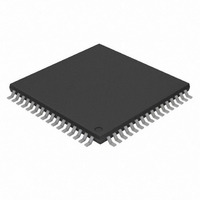PIC18F64J11T-I/PT Microchip Technology, PIC18F64J11T-I/PT Datasheet - Page 12

PIC18F64J11T-I/PT
Manufacturer Part Number
PIC18F64J11T-I/PT
Description
16KB, Flash, 1024bytes-RAM, 51I/O, 8-bit Family,nanoWatt 64 TQFP 10x10x1mm T/R
Manufacturer
Microchip Technology
Series
PIC® 18Fr
Datasheets
1.PIC16F616T-ISL.pdf
(8 pages)
2.PIC18F63J11-IPT.pdf
(408 pages)
3.PIC18F63J11-IPT.pdf
(4 pages)
4.PIC18F63J11-IPT.pdf
(36 pages)
5.PIC18F63J11-IPT.pdf
(10 pages)
6.PIC18F63J11-IPT.pdf
(6 pages)
Specifications of PIC18F64J11T-I/PT
Core Processor
PIC
Core Size
8-Bit
Speed
40MHz
Connectivity
I²C, SPI, UART/USART
Peripherals
Brown-out Detect/Reset, LVD, POR, PWM, WDT
Number Of I /o
51
Program Memory Size
16KB (8K x 16)
Program Memory Type
FLASH
Ram Size
1K x 8
Voltage - Supply (vcc/vdd)
2 V ~ 3.6 V
Data Converters
A/D 12x10b
Oscillator Type
Internal
Operating Temperature
-40°C ~ 85°C
Package / Case
64-TFQFP
Lead Free Status / RoHS Status
Lead free / RoHS Compliant
For Use With
MA180018 - MODULE PLUG-IN 18F85J11AC162079 - HEADER MPLAB ICD2 18F85J90 64/80AC164327 - MODULE SKT FOR 64TQFP
Eeprom Size
-
Lead Free Status / RoHS Status
Lead free / RoHS Compliant
Other names
PIC18F64J11T-I/PTTR
Available stocks
Company
Part Number
Manufacturer
Quantity
Price
Company:
Part Number:
PIC18F64J11T-I/PT
Manufacturer:
Microchip Technology
Quantity:
10 000
PIC18F6XJXX/8XJXX
2.3
Figure 2-9 shows the high-level overview of the
programming process. First, a Bulk Erase is performed.
Next, the code memory is programmed. Since the only
nonvolatile Configuration Words are within the code
memory space, they too are programmed as if they
were code. Code memory (including the Configuration
Words) is then verified to ensure that programming was
successful.
FIGURE 2-9:
FIGURE 2-10:
DS39644L-page 12
Note:
MCLR
V
PGD
PGC
DD
Overview of the Programming
Process
In order to maintain the endurance of the
cells, each Flash byte should not be
programmed more than twice between
erase operations. A Bulk Erase of the
device is required before attempting to
modify the contents a third time.
Program Memory
Verify Program
Enter ICSP™
Perform Bulk
P13
HIGH-LEVEL
PROGRAMMING FLOW
ENTERING PROGRAM/VERIFY MODE
Exit ICSP
Erase
Done
Start
P19
V
b31
IH
0
b30
1
Program/Verify Entry Code = 4D434850h
b29
0
P2B
b28
0
P2A
b27
Program/Verify mode is to be maintained. An interval of
presenting data on PGD. Signals appearing on PGD
2.4
Entry into ICSP modes for PIC18F6XJXX/8XJXX
devices is somewhat different than previous PIC18
devices. As shown in Figure 2-10, entering ICSP
Program/Verify mode requires three steps:
1.
2.
3.
The programming voltage applied to MCLR is V
usually, V
holding at V
least P19 must elapse before presenting the key
sequence on PGD.
The key sequence is a specific 32-bit pattern,
‘0100 1101 0100 0011 0100 1000 0101 0000’
(more easily remembered as 4D434850h in hexa-
decimal). The device will enter Program/Verify mode
only if the sequence is valid. The Most Significant bit of
the most significant nibble must be shifted in first.
Once the key sequence is complete, V
applied to MCLR and held at that level for as long as
at least time, P20 and P12, must elapse before
before P12 has elapsed may not be interpreted as valid.
On successful entry, the program memory can be
accessed and programmed in serial fashion. While in
the Program/Verify mode, all unused I/Os are placed in
the high-impedance state.
Exiting Program/Verify mode is done by removing V
from MCLR, as shown in Figure 2-11. The only require-
ment for exit is that an interval, P16, should elapse
between the last clock and the program signals on
PGC and PGD before removing V
When V
the ordinary operational mode and begin executing the
application instructions.
1
...
Voltage is briefly applied to the MCLR pin.
A 32-bit key sequence is presented on PGD.
Voltage is reapplied to MCLR.
IH
Entering and Exiting ICSP
Program/Verify Mode
DD
b3
is reapplied to MCLR, the device will enter
0
. There is no minimum time requirement for
IH
. After V
b2
0
b1
0
IH
V
2009 Microchip Technology Inc.
IH
is removed, an interval of at
b0
0
P20
IH
.
P12
IH
must be
IH
, or
IH












